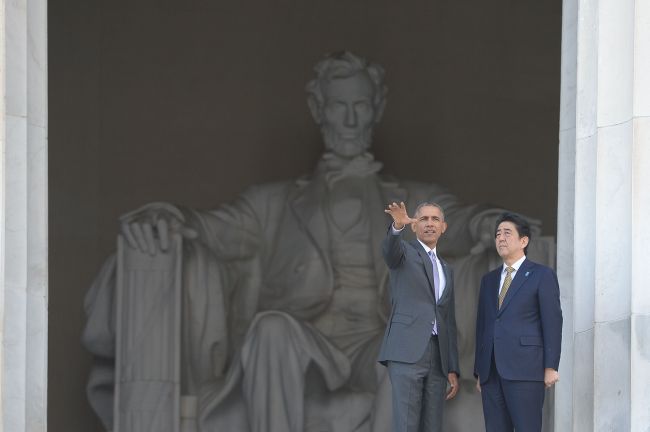Japan’s expanded security role under the revised U.S.-Japan defense cooperation guidelines will not hurt South Korea’s security interests, Seoul officials and analysts said Tuesday, easing lingering concerns over Tokyo’s possible wartime intervention on the peninsula.
Through the guidelines revised on Monday, Washington and Tokyo sought to address Seoul’s concerns over Japan’s exercise of collective self-defense, the use of force to help an ally under attack, on and near the Korean Peninsula.
The revision stipulates that when it comes to taking actions involving the use of force, the U.S. and Japan are to act in accordance with international law including “full respect for the sovereignty” of a third nation, which Seoul officials say refers to South Korea.

U.S. President Barack Obama accompanies Japan’s Prime Minister Shizo Abe during a visit to the Lincoln Memorial in Washington on Monday. (AFP-Yonhap)
“We take note of the fact that (the U.S. and Japan) have made it clear that they would fully respect the sovereignty of a third country when it comes to Japan’s exercise of the right to collective self-defense,” Seoul’s Foreign Ministry said in a commentary.
“Our government’s demands concerning the security of the Korean Peninsula and our security interests have been reflected in the guidelines,” the commentary added, noting that Washington and Tokyo have made efforts to ensure transparency in the revision process.
After the bilateral Security Consultative Committee meeting, better known here as the two-plus-two meeting of defense and foreign ministers in New York, the U.S. and Japan announced the revision of the 1997 guidelines to better counter the emerging security challenges including those in space and cyberspace.
Under the new guidelines, the roles and missions of Japan’s Self-Defense Forces, which have been restricted by the war-renouncing Article 9 of the constitution, will be expanded.
The SDF has so far been able to operate on the Japanese mainland and in the surrounding areas, but the new guidelines allow the SDF to operate alongside the U.S. forces in Asia-Pacific and elsewhere around the world.
The guidelines also allow Japan to militarily support close countries under attack, even if it is not directly attacked. This content has sparked concerns that Japanese troops can enter South Korean territory during wartime ― a scenario South Koreans harboring historical resentment toward its onetime colonizer want to avoid.
Seoul officials said the new guidelines obligate Japanese forces to secure invitation or consent from the Seoul government should they need to enter the peninsula, although the guidelines do not specifically mention it.
“The issue of Japanese troops entering South Korean territory is clearly a matter of sovereignty. Thus, this requires that Japan secure South Korea’s consent for their forces’ entry into the peninsula under any circumstances,” said a senior Defense Ministry official, declining to be named.
“The guidelines are just a basic framework and a policy direction for defense cooperation between the two sides, and thus they do not touch on any specific scenarios. Thus our government will continue to consult with Washington and Tokyo over the security issues the public and media have raised.”
Park Young-june, Japan expert at Korea National Defense University, said that the guidelines do not include any specific content that may mar South Korea’s security interests.
“The guidelines say the two nations will respect the sovereignty of a third nation, and take actions including the use of force in an appropriate manner when there is a manifestly clear security threat to Japan. This indicates that the likelihood of Japan unilaterally entering the peninsula is less,” he said.
Meanwhile, under the guidelines, the two countries are to establish a standing whole-of-government coordination mechanism to enable a “seamless response” in all phases, from peacetime to contingencies. The mechanism is to further enhance the cohesion in joint operations of the allied forces, analysts said.
Japan has been working to develop security legislations to back the revised guidelines. After the legislation work is done, the U.S. and Japan will draw up military operational plans to implement the roles and missions stipulated in the new defense guidelines.
By Song Sang-ho (sshluck@heraldcorp.com)




![[KH Explains] No more 'Michael' at Kakao Games](http://res.heraldm.com/phpwas/restmb_idxmake.php?idx=645&simg=/content/image/2024/04/28/20240428050183_0.jpg&u=20240428180321)

